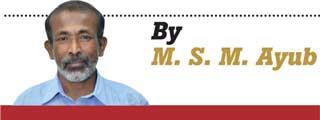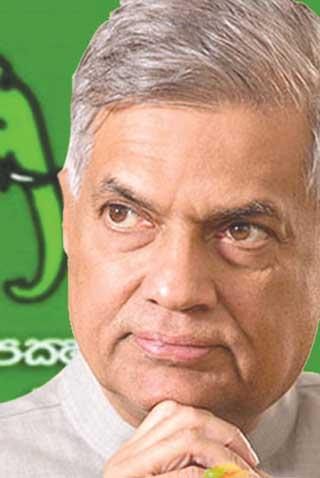Reply To:
Name - Reply Comment
 The two main political parties that ruled the country alternately since Independence, the United National Party (UNP) and the Sri Lanka Freedom Party (SLFP) celebrated their 75th and 70th anniversaries respectively, a few days ago. Unfortunately for them they celebrated the anniversaries on September 2 and 5 as parties that cannot make any impact on the country’s politics.
The two main political parties that ruled the country alternately since Independence, the United National Party (UNP) and the Sri Lanka Freedom Party (SLFP) celebrated their 75th and 70th anniversaries respectively, a few days ago. Unfortunately for them they celebrated the anniversaries on September 2 and 5 as parties that cannot make any impact on the country’s politics.
The loyalists of both parties, leave alone the general public, did not seem to have any enthusiasm over their party anniversaries. In fairness to them it must be noted that the events were held amidst a quarantine curfew that is in force since August 20 and the media was preoccupied with COVID 19 related issues.
 The UNP was able to win a solitary seat in the current parliament at the election held on August 5, last year while the SLFP managed to secure 16 seats by getting into a coalition with the ruling Sri Lanka Podujan Peramuna (SLPP). Yet, the SLFP is also a spent force even within the SLPP coalition as the latter with other small parties has obtained about 135 seats in parliament.
The UNP was able to win a solitary seat in the current parliament at the election held on August 5, last year while the SLFP managed to secure 16 seats by getting into a coalition with the ruling Sri Lanka Podujan Peramuna (SLPP). Yet, the SLFP is also a spent force even within the SLPP coalition as the latter with other small parties has obtained about 135 seats in parliament.
Although SLFP leader and former President Maithripala Sirisena did not present any plan to revive his party or for the economic development of the country at his party’s anniversary, UNP leader Ranil Wickremesinghe did.
Wickremesinghe who was the Prime Minister under President Sirisena and President Chandrika Kumaratunga presented a programme which he had titled “Great Sri Lanka.” He stated that the “Great Sri Lanka” would be built with “fourfold security and protection” through an “iron policy framework.”
He declared that UNP will be able to “recreate the great Sri Lanka at the dawn of the century of independence in another 27 years under a short-term plan, alongside a long-term programme to revive the economy and rebuild the country.” The long term programme “is to create a great Sri Lanka in the long run. The other short-term program is to build the country’s economy and provide relief to improve the living standards of the people” he emphasised.
Explaining his plan further, the former Prime Minister said that his party is proposing to develop the country in the future within an unchanging iron policy framework. “It must be said that this policy framework is strengthened by a legal obligation not to change when governments change.”
Ranil Wickremesinghe who was the Prime Minister under President Sirisena and President Chandrika Kumaratunga presented a programme which he had titled “Great Sri Lanka.” He stated that the “Great Sri Lanka” would be built with “fourfold security and protection” through an “iron policy framework.”
Time and again people as well as politicians lament over absence of long lasting policies or laws whenever each of the two main parties change the laws and policies brought in by the previous governments, as cited by Wickremesinghe. However, what is overlooked is that all governments - irrespective of the party in power - giving precedence to the interests of the rich over the poor has been the basic, unchanging and constant policy throughout.
In fact it is not desirable to change the policies and laws within a short period as happening in Sri Lanka where laws and even Constitutions are made or changed based on the interest of the political parties and not on those of the people. Nonetheless, desirability and viability of an unchanging policy or law is a highly contentious. The validity of an unchanging policy or a law is decided by the acceptance of it by the people and its capability to stand the test of time. The needs of the people are changing in line with the fast changing economic, social, and international situations. Also even a genuine measure might be taken based on miscalculations.
We have seen hundreds of policy declarations and election manifestoes with lofty ideals and attractive promises put forward by various political parties for the past 73 years, since the Independence. What is interesting is that they have been changing their very policy declarations and election manifestoes at each consecutive election.
For instance, the mixed electoral system was agreed upon by almost all active political parties after deliberations lasted for 10 years since 2003. But it was proved messy, when it was put in practice at the last local government elections in February, 2018.
The practicability of making unchanging policies and laws is also remote. Ranil Wickremesinghe proposes that this policy framework must be strengthened by a legal obligation not to change when governments change. The only way to do this is to raise the special majority that is required to pass special laws in parliament from two thirds to three fourths or four fifths or five sixths. It is extremely unlikely that the UNP would get such a majority power in Parliament, given the highly divisive politics in the country. On the other hand, what would be situation if the policy framework failed to stand the test of time?
However, nobody would contest – unless politically motivated - the UNP leader’s “four-fold security and protection to create a great Sri Lanka and a prosperous future for the citizens.” It includes health care protection, economic security, knowledge security, and environmental protection and seems to encompass everything related to governance.
He then explains them. “Under health care, our primary objective is to create a healthy nation by protecting the people from the fear of epidemics as well as from other health hazards. Our second goal is to present a new economic program that achieves social justice that can compete with the world in economic security. Our third objective is to create a 21st century society with a modern education system with innovative ideas that share knowledge equally. Our fourth objective is to create a country based on the Paris Agreement that is resilient and will control climate change.”
We have seen hundreds of policy declarations and election manifestoes with lofty ideals and attractive promises put forward by various political parties for the past 73 years, since the Independence. What is interesting is that they have been changing their very policy declarations and election manifestoes at each consecutive election. Wickremesinghe summarises the end result of those declarations and manifestoes as well in his speech. “In 1948, we were on an equal footing with Japan, the leading country in Asia. But today we are ahead only of Afghanistan “he stated.
This is not a situation that befell the country subsequent to the SLPP took office in 2019, but it was a gradual degeneration that occurred during the past 73 years out of which UNP was in power for 35 years. Hence the major challenge that the UNP has to face is to infuse confidence and trust in the people on its “four-fold security and protection to create a great Sri Lanka” programme, against this backdrop. It sometimes would need courageous self criticism and a roadmap with viable time frames and specific details. People must be able to distinguish the programme from the past policy declarations and manifestoes of various political parties.